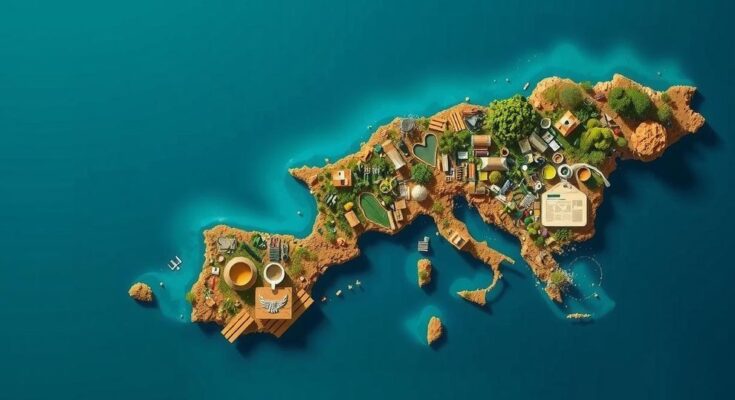Sardinia is actively fighting for climate justice by reclaiming its control over urban planning and renewable energy, resisting top-down initiatives from the Italian government. President Alessandro Todde leads the charge against corporate encroachments on local landscapes, emphasizing the importance of protecting cultural and environmental heritage amidst the climate emergency. Public activism and a recent statement of 210,000 signatures underscore the island’s commitment to local governance in energy decisions, positioning Sardinia as a potential leader in green energy transitions.
Sardinia, an autonomous region of Italy, is taking significant steps to combat the climate emergency, advocating for a climate strategy that prioritizes local governance and citizen involvement. Amid increased climate activism, President Alessandra Todde emphasizes that the island seeks to reclaim its jurisdiction over urban planning and renewable energy installations, resisting the Italian government’s top-down energy policies that allegedly exploit its resources. A recent protest garnered more than 210,000 signatures advocating for the ‘Pratobello 24’ initiative, which empowers local decisions regarding energy developments.
In a noteworthy political stance, the Sardinian Regional Council further legislated measures to designate appropriate areas for renewable energy systems. This move aims to protect the island’s cultural and environmental assets against overwhelming private energy projects—an initiative that has provoked a political clash with the Italian government. Not only is there an urgency to transition to green energy, but there is also a critical desire among Sardinians to preserve their cultural heritage and unique landscapes, which face threats from proposed infrastructure developments. Local activism is increasingly vocal, showcasing a broader cultural awakening that intertwines environmental concerns with community rights and the historical context of Sardinia’s autonomy.
Sardinia’s journey presents a compelling case study on how local initiatives can shape climate policies that are reflective of regional identities and values. As the island positions itself as a leader in green energy transition, it simultaneously serves as a symbolic beacon for local governance and activism in the face of climate change.
Sardinia has a rich and complex history, marked by its status as an autonomous region within Italy, allowing it special jurisdiction over various local matters. In recent years, climate change and environmental degradation have spurred political movements and social actions around the world. With its unique archaeological and cultural heritage, Sardinians are advocating for a sustainable future that respects their landscape while addressing the pressing climate crisis. Through initiatives like the Pratobello 24, Sardinians are pushing back against corporate and governmental encroachments on their land, demanding a voice in their energy policies.
Sardinia is exemplifying a proactive approach to combating climate change through local governance and citizen engagement. The community’s efforts reflect a strong determination to protect its cultural heritage while transitioning to renewable energy. This movement not only addresses climate concerns but also symbolizes a broader call for autonomy in decision-making concerning local resources and energy projects. Sardinia’s actions set a precedent for other regions facing similar challenges, demonstrating the power of local agency in shaping a sustainable future.
Original Source: www.salon.com




